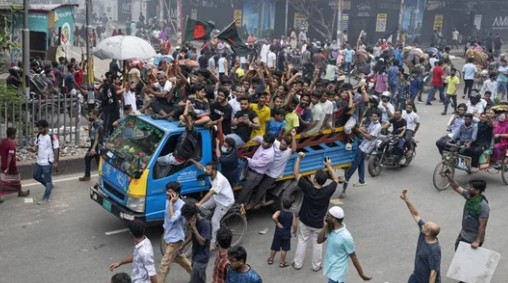Prime Minister Sheikh Hasina has been unexpectedly thrown into turmoil as a sudden and dramatic escalation in protests and political instability disrupts her administration’s grip on power. The surge in civil unrest has left the government scrambling to address mounting challenges and regain control over a rapidly deteriorating situation.
The escalation began in recent weeks, initially triggered by public dissatisfaction with economic conditions and governance issues. What started as small-scale demonstrations has rapidly evolved into widespread unrest, with mass protests erupting in cities across Bangladesh. The scale and intensity of the protests have reportedly caught the government off-guard, revealing significant gaps in its crisis management strategy.
Eyewitnesses have described chaotic scenes of clashes between protesters and security forces, with violence escalating and several casualties reported. The unrest has also been fueled by growing opposition demands for political reform and accountability, further complicating the government’s efforts to stabilize the situation.
Political analysts suggest that the suddenness and magnitude of the unrest have exposed vulnerabilities in Hasina’s administration. “The rapid escalation of protests has clearly taken the government by surprise,” said Dr. Farhan Ahmed, a political analyst based in Dhaka. “The administration’s inability to anticipate and effectively respond to these developments has significantly undermined its authority.”
In response to the crisis, Prime Minister Hasina has called for restraint and proposed dialogue to address the protesters’ grievances. However, critics argue that the government’s response has been inadequate and that substantial reforms are needed to address the underlying issues driving the unrest.
The opposition has seized on the opportunity to criticize the current administration and mobilize support for their cause, adding to the political pressure facing Hasina. With the situation continuing to evolve, there are concerns about further instability and the potential for increased violence.
The international community is closely monitoring the developments in Bangladesh, with calls for a peaceful resolution and support for democratic processes. As the Prime Minister and her government work to navigate this challenging period, the future direction of Bangladesh’s political landscape remains uncertain.








 India
India












